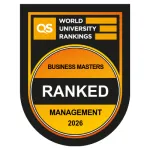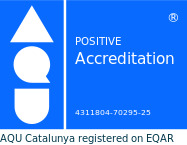Official University Master’s Degree in Arts and Cultural Management (Spanish Programme)
Home
- Type of programme
- Official masters
- Campus
- Campus Barcelona
- Duration
- From October to July
- Credits
- 60
- Schedule
- From Monday to Friday from 4.30pm to 8.30pm
- Language
- Spanish and English.
- Places
- 65
- Modality
- On site
Reasons to study this master’s degree
- Interdisciplinary Training in Cultural Management
Acquire key skills in project management, funding, marketing, communication, policies, legislation, patronage, and cultural production.
- Faculty with Strong Academic and Professional Backgrounds
Learn from academics and active professionals who provide a current, applied perspective closely connected to the realities of the cultural sector.
- Theory and Practice Methodology
Access Barcelona’s leading cultural institutions —such as CaixaForum, Fundació Miró, Razzmatazz, or Teatre Lliure— through more than 500 collaboration agreements, and complement your studies with practical experiences in Spain and abroad.
- Continue Your Academic Experience Internationally
Expand and pursue your studies and research through our network of associations and collaborations in Asia (Hong Kong, Manila), the Middle East (Erbil), Africa (Lagos), South America, Europe, and the United States (Boston).
- Enhance Your Leadership and Professional Development
Develop and implement your own cultural project during the Master’s program and gain access to cultural management residencies in Europe and Latin America.
- Global Network of Contacts
Study alongside students from more than 25 nationalities, broaden your international perspective, and become part of an active alumni network with over 1,000 professionals across more than 80 countries.
Over 25 Years Training Professionals in Cultural Management from Our Barcelona Campus
The Master’s Degree is part of the QS Business Master’s Rankings 2026, one of the most prestigious international rankings in both academic and professional fields. This recognition strengthens the program’s international projection, positioning it among the most valued and competitive Cultural Management and MBA programs worldwide —and the only one taught 100% in Spanish in Barcelona.
Studying in Spanish: An Academic and Strategic Advantage for Your Professional Future
With more than 600 million speakers worldwide, Spanish is the second most widely spoken native language after Mandarin Chinese. Studying in this language from Barcelona —a city open to the world and multilingual, where more than 300 languages coexist alongside Spanish and Catalan— will allow you to develop a multicultural perspective essential to addressing the challenges of contemporary cultural management.
Testimonials
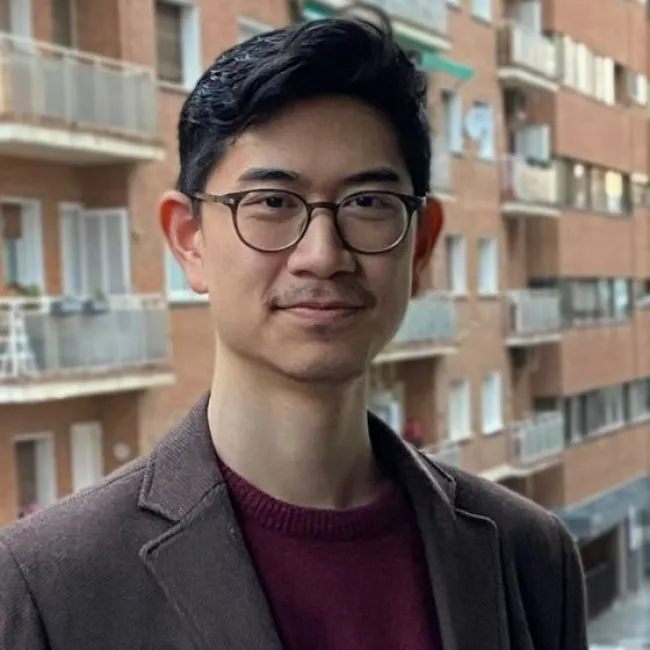
The Master’s learning curve is very well adapted for people coming from different backgrounds. Being able to work and exchange opinions with both artistic and non-artistic profiles strengthens and broadens our way of seeing society and the world.
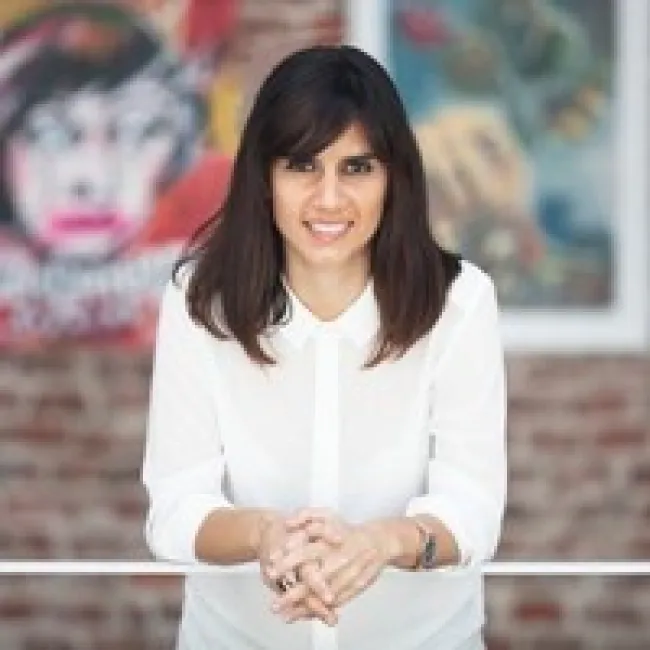
My experience at UIC Barcelona marked my professional career. In terms of education, it was a turning point that led me to make the decision to dedicate myself full-time to cultural management.
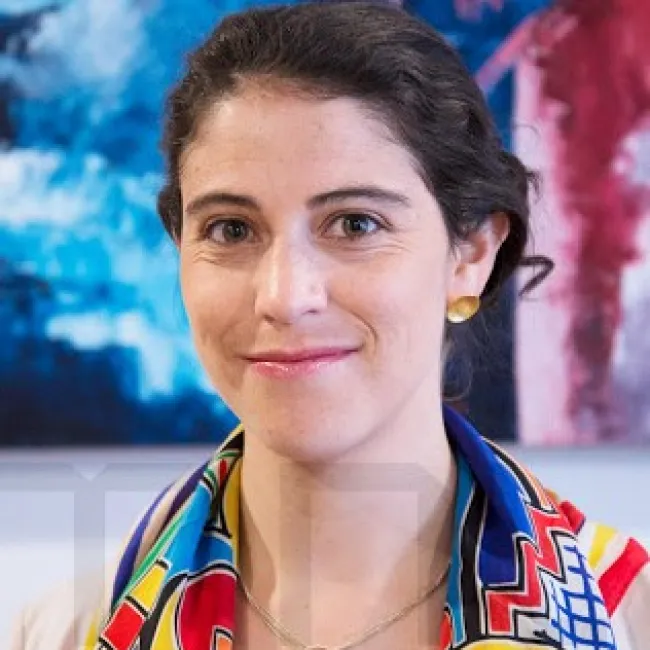
The Master’s is a set of elements that help you grow both as a person and as a professional. Being able to share experiences in the classroom with professors who are active in the field and who enrichingly combine theory with practice was a very positive aspect of this program.
What skills will you acquire upon completion of the Master's in Cultural Management?
Understand culture and its policies
Reflect on cultural theory and distinguish the features of local, national, and international policies.
Diagnose the cultural fabric
Analyze the cultural reality of a society and identify its needs and opportunities.
Plan and manage projects
Design, program, manage, and evaluate innovative cultural projects.
Lead interdisciplinary teams
Create, manage, and lead diverse and multidisciplinary human teams.
Manage resources and communication
Raise and administer funding, and apply marketing and communication strategies.
Innovate with social responsibility
Apply new technologies and develop an ethical and social commitment in cultural management.
Continue your learning experience abroad
-
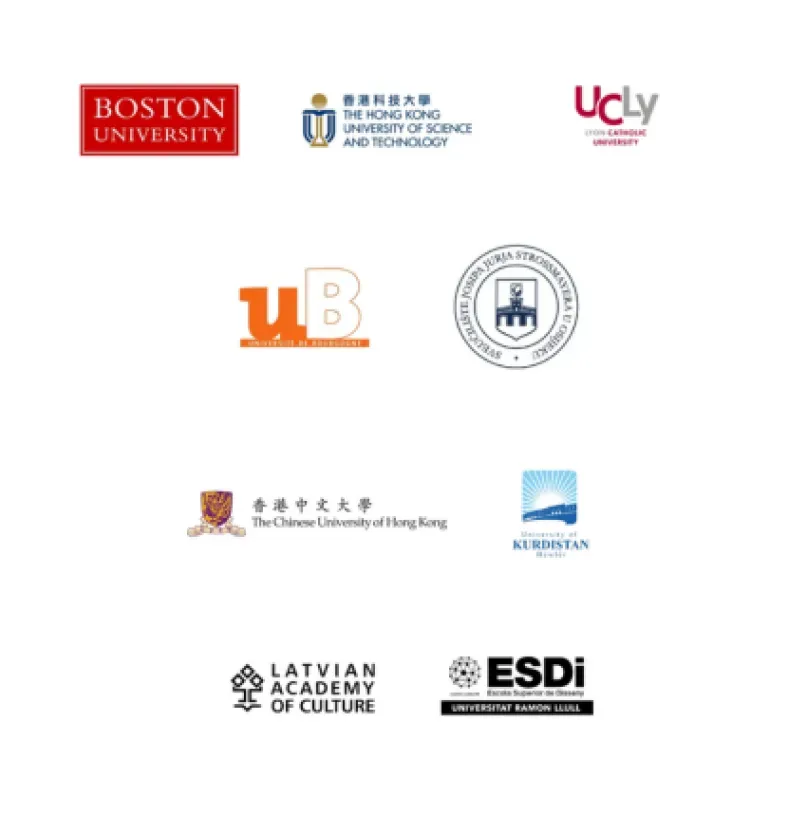 Take part in an international academic exchange
Take part in an international academic exchangeAt UIC Barcelona, we promote exchange and knowledge transfer as fundamental pillars of a comprehensive education. Thanks to our network of international agreements, we offer our students the opportunity to carry out academic and research exchanges at prestigious institutions in Europe, America, Africa and Asia.
-
 Study extension in Hong Kong
Study extension in Hong KongIf your interest is to explore the dynamic Asian cultural landscape, you can choose to undertake a study extension in Hong Kong. This Master’s Degree in Cultural Management at UIC Barcelona, in collaboration with the prestigious Chinese University of Hong Kong, offers a unique immersion in one of the world’s most vibrant and cosmopolitan cities, where tradition and modernity meet, creating an ideal environment for studying cultural management in a global context.
-
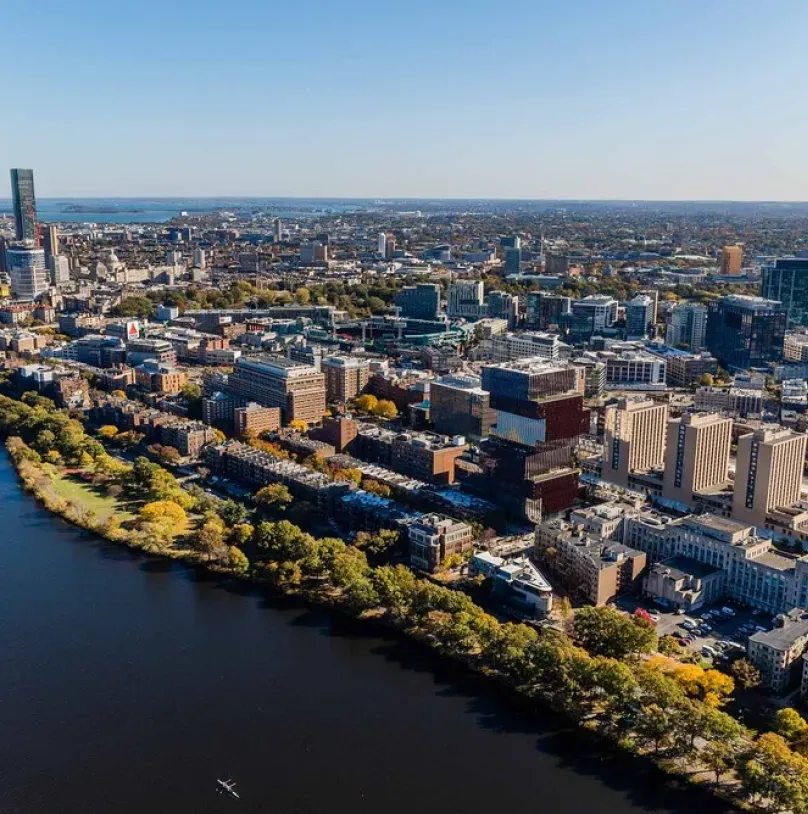 Access a double degree in the United States
Access a double degree in the United StatesThe Master’s Degree in Cultural Management at UIC Barcelona offers the opportunity to obtain a double degree thanks to the agreement established with the Master of Science in Arts Administration at Boston University. This program allows you to broaden your knowledge and professional horizons by benefiting from the network of contacts and opportunities of a top-tier U.S. university. Take part in an international academic exchange.
More than 1,000 professionals from 80 nationalities are part of the Alumni community of the Master’s Degree in Cultural Management
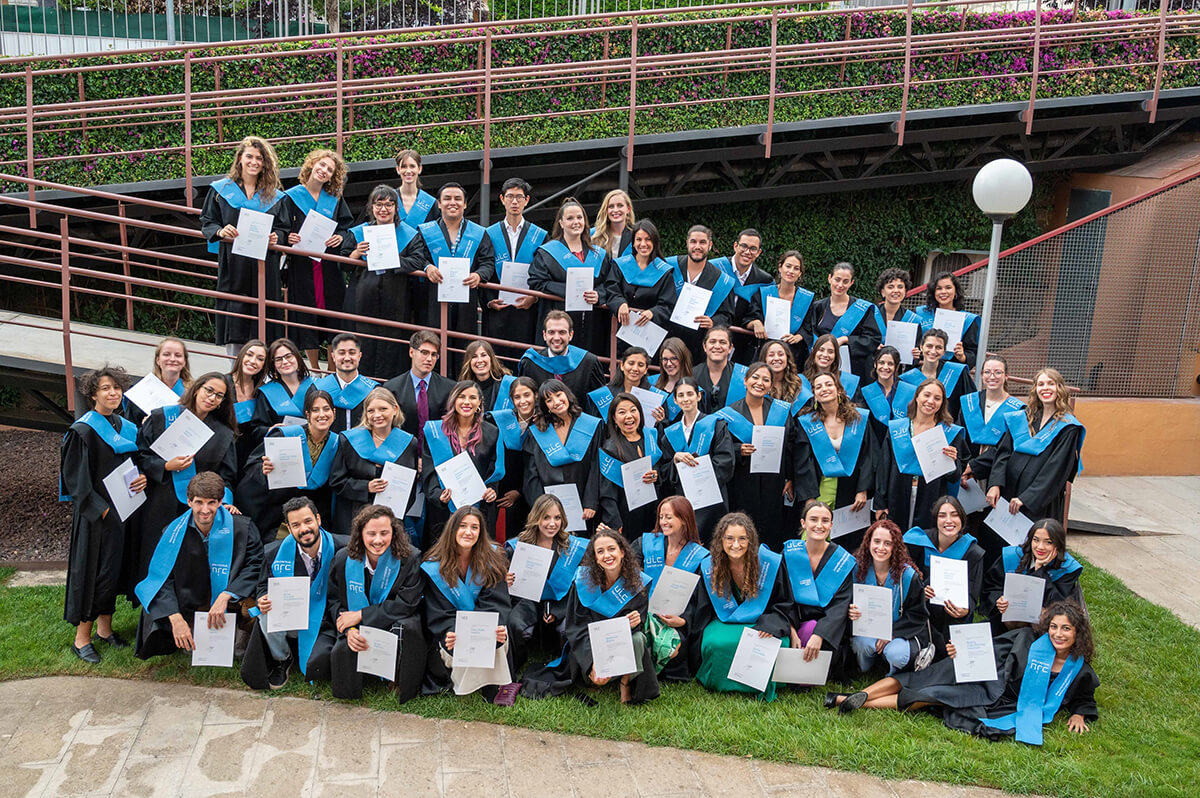
Additional information
Other similar studies
Presentation
Academic year 2026-2027: 26th edition
The UIC Barcelona's University Master's Degree in Cultural Management takes a practical approach and has a strong international outlook. Start your education as a cultural manager and position yourself in an emerging sector which generates jobs involving projects with an international impact.
At UIC Barcelona you will take a comprehensive look at the work processes of cultural services and products from an entrepreneurial perspective. You will look in greater depth into the work dynamics of the two specialisation tracks: visual arts and cultural heritage or creative cultural industries and you will acquire a polyvalent, multidisciplinary profile.
The classes will alternate with study visits, where you will have the opportunity to visit cultural institutions and facilities and learn from the people running them. You will also have access to master classes and workshops given by national and international experts.
* This Master's Degree is an official postgraduate qualification which has been adapted to the European Higher Education Area regulations, with an assessment carried out by the Catalan University Quality Assurance Agency (AQU Catalunya) and the National Evaluation Agency for Quality and Accreditation (ANECA). .
Objectives
The UIC Barcelona gives you the tools you need to become a cultural manager.
The objectives of the master's degree programme include:
- To offer a reflection on the theory of culture in the 21st century and its social effects.
- To provide instruction about the characteristic features of local, national and international cultural policies.
- To teach students how to analyse a society's cultural fabric and prepare a diagnosis of needs and opportunities.
- To ensure students can apply management tools to the subjects of financing, financial management, human resources, marketing, communication, scheduling and production in relation to cultural events.
- To encourage the acquisition of personal entrepreneurial skills.
- To provide instruction about the specific management requirements of each cultural areateach students to evaluate cultural projects and programmes.
- To immerse students in professional reality.
- To introduce students to professional practice.
- To encourage a sense of social responsibility and ethical commitment.
Who It Is Aimed At. Incoming Student Profile
This master's programme is designed particularly for:
- Recent young university graduates who want to receive training as cultural managers.
- Active professionals with several years of experience who want to improve their training in management and management processes and methods.
Students
The Master's Degree in Cultural Management offers the unique experience of an intensive exchange between students from different countries and continents and from different cultures, languages and religions. For the degree, culture comes to life in exchange and through communication. Cultural exchange is not just an academic objective, but a daily reality for each and every student in the classroom and at our Barcelona Campus. This is proven by the more than 900 alums from over 80 different countries that we have trained as cultural managers over the last 20 years.
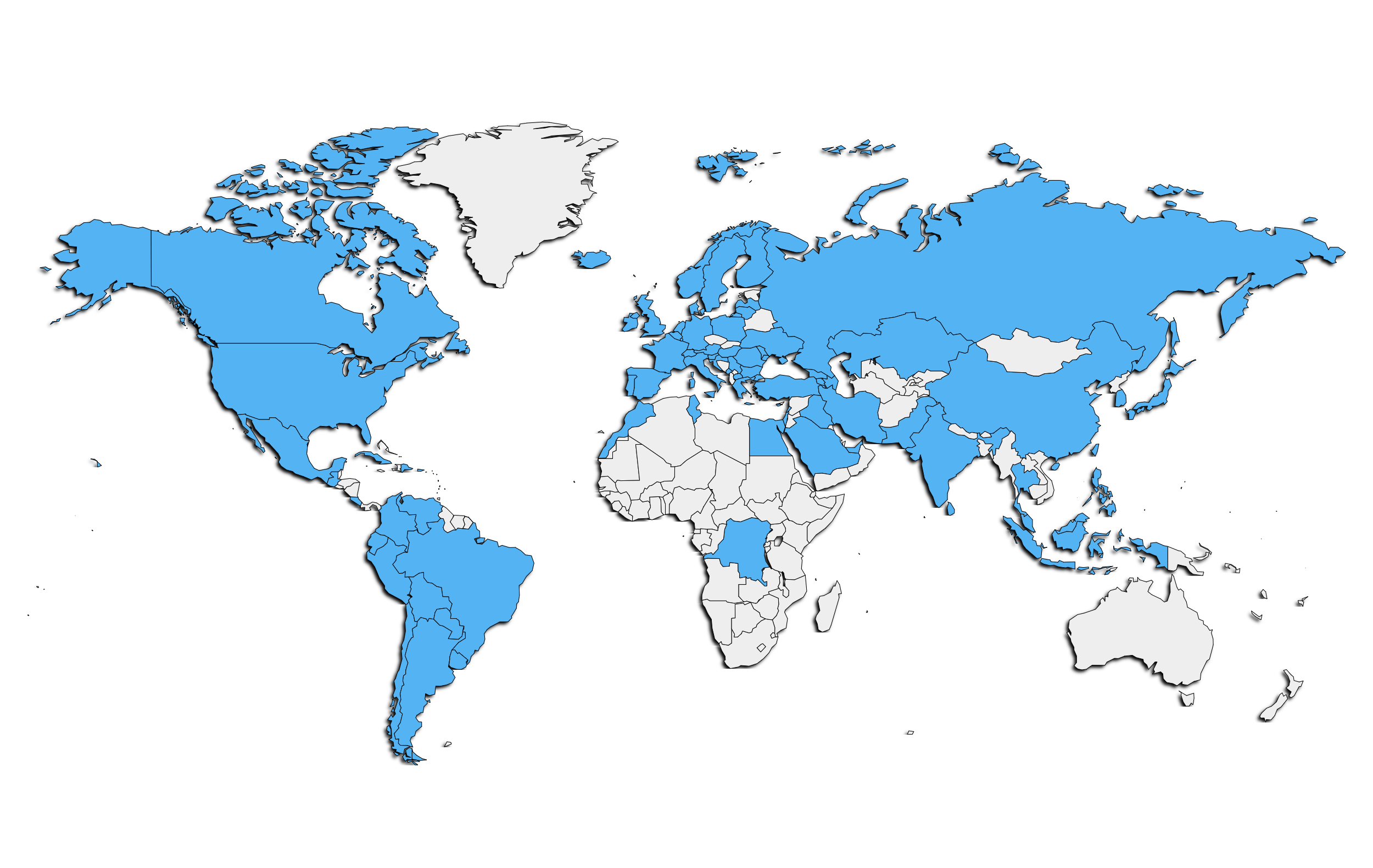
Competencies. Outgoing Profile
It will provide you the skills and competences specific to cultural management, among which the following stand out::
- Analysing a society's cultural fabric and preparing a diagnosis of needs and opportunities.
- Designing, scheduling, managing and assessing cultural projects.
- Creating, managing and leading interdisciplinary human teams.
- Attracting and managing economic resources in relation to cultural projects, companies and institutions.
- Designing marketing and communication strategies in the area of culture.
- Being familiar with and applying new technologies in the process of cultural management, production and dissemination.
- Encouraging a sense of social responsibility and ethical commitment.
Course directors and coordinators
Director
Christoph Pasour
crpasour@uic.es
Degree in Art History and Media Studies from the Freie Universität Berlin (Germany) and also Edinburgh University (UK). TV Producer. He has authored articles for newspapers and magazines on media art and cinematography. He was the project manager and curator at the Museum for Cinematography in Potsdam, Germany; commissioning Editor in the film department of the 3sat cultural television channel (Germany, Austria and Switzerland). He has also been involved in script development (fiction / non-fiction) for production companies in Berlin and Hamburg. He has been a producer/author on documentaries since 2005 for production companies in Berlin, Hamburg and Barcelona for broadcasters such as ARTE, 3sat, ARD, ZDF, RAI, YLE, TV3. He currently is the director of the University Master's Degree in Cultural Management at UIC Barcelona.
Coordination
Claudia Balboa Salas
cbalboa@uic.es
Degree in Conservation and Restoration of Cultural Heritage from the University of the Basque Country and University Master's Degree in Cultural Management from the UIC Barcelona. She has worked as a cultural manager at the Cervantes Institute in Beijing and collaborated with various companies and institutions in the design of cultural projects and exhibitions. She also participated in the conceptualisation of the infrastructure development plan for Langyuan Station in Beijing, to transform this industrial area of Pekin into a space for Culture and Creative Industries the country. After her experience in China she returned in October 2018 to Spain, as director of the Rioja Wine Cultural Centre, a historic building linked to wine tourism. As interim civil servant of the City Council she developed the Master Plan and cultural, social and training programme for the reopening of the facility. In 2020 Claudia established herself as independent cultural consultant and she collaborated with the Langyuan New Times Culture in the definition of the cultural development plan and a new urban space for the Music and Performing Arts in Wuzhen. She also provides services to mono office architecture studio production of artistic projects, such as “I Want to be the Future: The Anatomy of Technological Seduction,” developed together with the Chinese artist Cao Fei, for the Whitechapel Gallery in London and the Alserkal Avenue in Dubai. She currently coordinates the Postgraduate Studies in Cultural Management at UIC Barcelona.
Academic accreditation
Máster Universitario en Gestión Cultural por la Universitat Internacional de Catalunya.
Curriculum
Internship
Work placements are one of the pillars of the University Master’s Degree in Cultural Management’s curriculum, because they facilitate the students’ integration into a cultural company or institution, enable them to apply their knowledge and help them develop the professional competences a cultural manager requires. Curricular work placements are compulsory and are worth 12 ECTS. They are preferably done on-site.
What’s more, as a Cultural Management master’s student, you have access to the ERASMUS+ programme managed by the University's International Relations Service, and qualify for financial aid to do a work placement abroad either as a student or a recent graduate.
Educational Cooperation Agreements for External Work Placements
The UIC Barcelona Faculty of Humanities has an extensive work placement programme covering more than 400 cultural entities, companies and institutions at the local, national and international level.
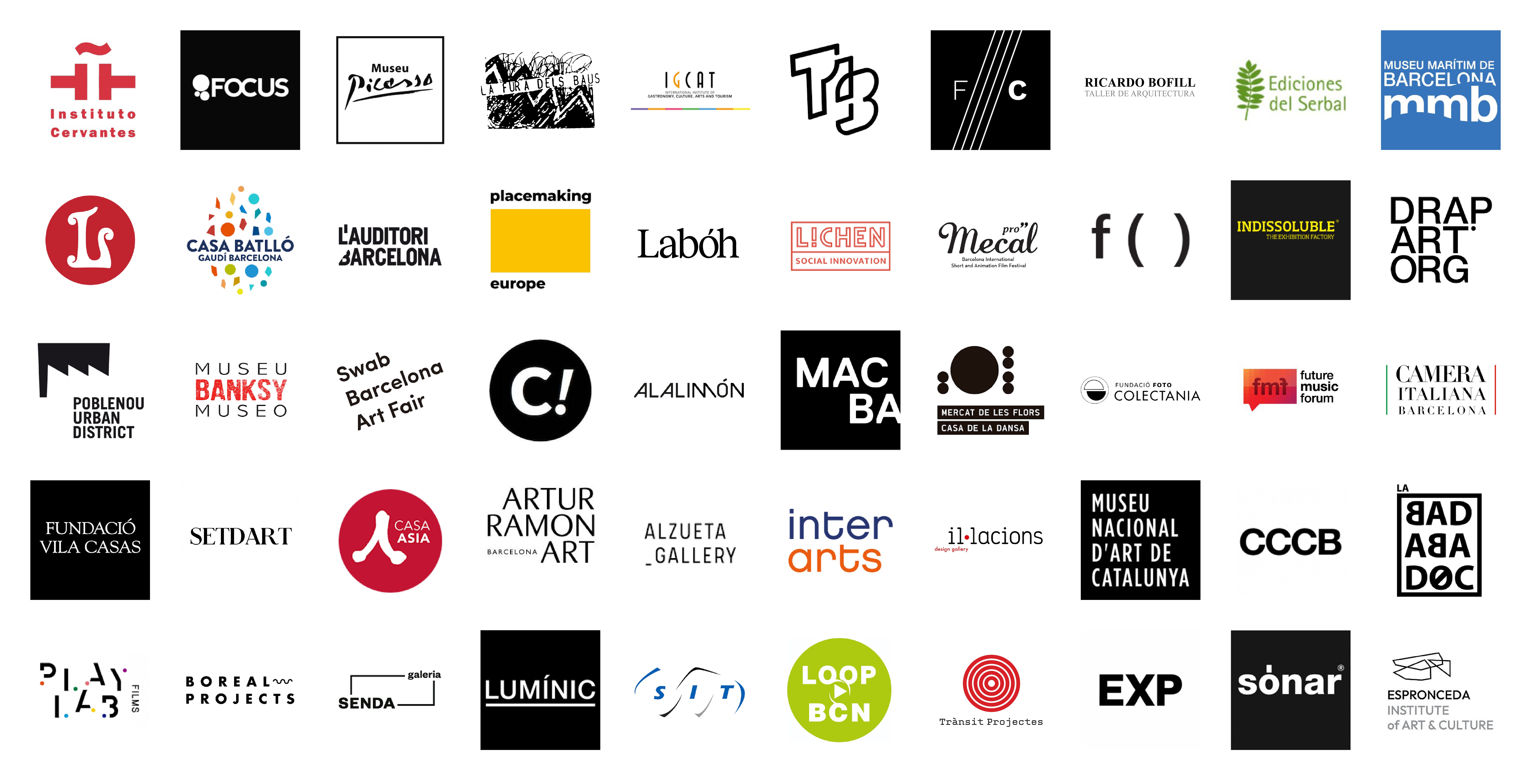
If you want to offer a work placement to students or recent graduates, please send an email to cbalboa@uic.es with your proposal.
Objectives
- Learn how an entity or company that offers cultural products or services works.
- Learn the overall process of executing a cultural product or cultural service.
- Become part of a work team and learn the work dynamics of the company or institution.
- Manage one aspect or part of the project or service according to previously set objectives.
- Develop initiative and responsibility in professional practice.
- Analyse and reflect on the work experience, make a critical assessment of the work carried out.
The academic tutor and the degree programme’s work placement coordinator will ensure that each student’s work plan is related to the objectives and competences the students should acquire.
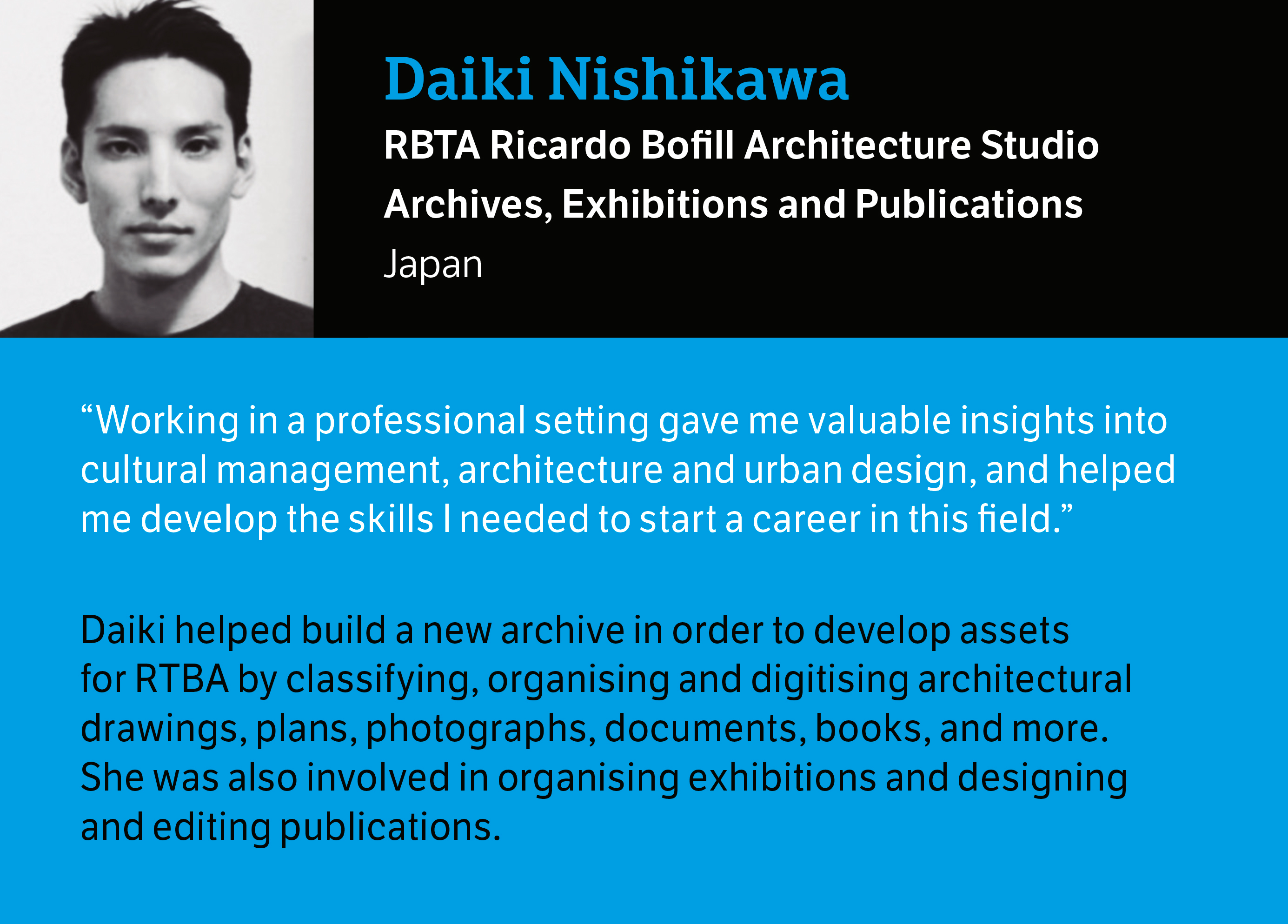 | 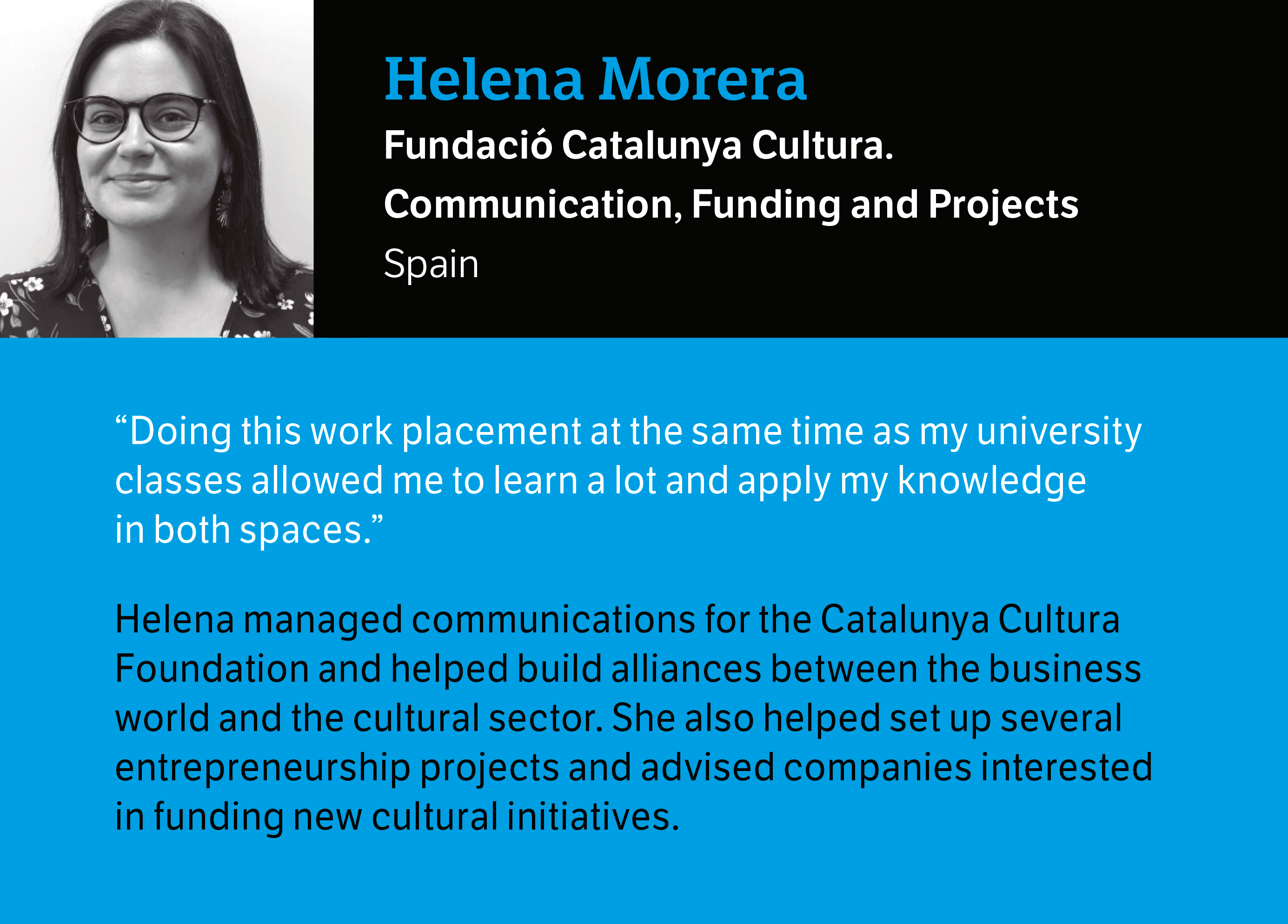 |
Regulations
Professional opportunities
UIC Barcelona's commitment is to provide students with the best possible academic preparation. This includes placing appropriate instruments at the student’s disposal that will facilitate their work placement.
University Master's Degree in Cultural Management graduates acquire the skills necessary to work in the following fields:
- Management of cultural services or projects in the public sphere (on a local, provincial, regional or state level) or for public-private bodies: public authorities, museums, theatres, cultural centres, multicultural facilities, etc.
- Management of private companies that offer cultural services or products: film production companies; companies that design online cultural content; companies that manage heritage promotion projects; art galleries; foundations; companies that promote cultural tourism; theatre, film and dance festival production companies; companies or NGOs engaged in international cultural cooperation, etc.
Information sessions
Attend the next Informative Session
If you want to know in detail the study plan of this master's program and the most in-demand career opportunities currently, join the next information session led by Christoph Pasour, academic director of the Master's Degree in Cultural Management, and Claudia Balboa, coordinator of the Postgraduate Studies in Cultural Management and Professional Practices at UIC Barcelona.
Admission process
Admission process for master's and postgraduate programmes
-
Request information
-
Application for admission
- Delivery of documentation
- Validation of documentation
-
Assessment of candidate
-
Result of admission process
- Admission
- On hold
- No admission
-
Deposit paid
-
Enrolment
Between July and September
- Tuition paid
-
Welcome!
You are now part of UIC Barcelona
Admission Test
The admission test for the University Master’s Degree in Arts and Cultural Management consists of the preparation of a text commentary, which must be uploaded to the admissions platform within the indicated deadline, once the required documentation has been reviewed.
Requires documentation
Information about the documents required for admission to the Master's Degree in Arts and Cultural Management may be found by clicking on the following link:
Admission criteria
While all candidates who meet the access route requirements will be considered, acceptance will be determined based on the following criteria:
- Personal academic transcript of the earned degree
- Professional and academic CV
- Admission test
- Personal interview
Reservation and enrolment
Access routes
Information about the access routes for the Master’s Degree in Arts and Cultural Management may be found by clicking on the following link:
Prices, grants and financial aid
Price
139€ / ECTS x 60 = 8340€ (+ €509 Registrations fees). *Prices corresponding to the 2026-2027 academic year.
Grants
UIC Barcelona offers various fellowships supported by both public institutes (MEC or AGUAR), as well as private UIC Barcelona funds.
For further information, please check with our admissions department:
Grants offered by UIC Barcelona for master's degrees and postgraduate programmes
Other grants
Those pursuing master's degrees or postgraduate programmes studies at UIC Barcelona are also eligible for other scholarships.
Financing
In order to make tuition fee payments easier for students, UIC Barcelona offers various financing options through its partner banks.
Payment facilities
UIC Barcelona offers different payment options.
Final Master Project
Presentation
The Master’s Final Project constitutes the academic culmination of the Master’s Degree in Arts and Cultural Management. This course is designed to enable students to integrate and apply the knowledge, competencies, and skills acquired throughout the program in a practical or research-based project that demonstrates a deep understanding of the field of cultural management. The aim of the TFM is for students to demonstrate their capacity for analysis, planning, and management, as well as their command of the terminology and methodologies specific to the cultural sector. In addition, it seeks to highlight students’ ability to work autonomously and/or collaboratively, their written and oral communication skills, and their ability to defend a project before an academic and professional examination panel.
Throughout the entire process, students receive continuous guidance that ensures solid training at both the conceptual and methodological levels. During the development of the TFM, specific methodological support sessions are delivered by the program’s tutors and are tailored to each phase of the project.
These sessions are distributed across the first and second terms of the academic year and are designed to address questions, consolidate research methods, and guide decision-making at each stage of the work.
Once a TFM supervisor has been assigned, each student is entitled to six individual supervision meetings between January and June. Prior to each meeting, students must submit a progress report, which is reviewed and discussed by the supervisor, thus ensuring a structured and personalized monitoring of the process.
Modalities
The Master’s Degree in Arts and Cultural Management offers different TFM modalities, allowing students to adapt the focus of their work to their interests and professional goals:
Conceptual Project
Focused on the theoretical or strategic design of a cultural proposal, centered on the creation of a cultural model, program, or initiative.
Applied Project
Developed in collaboration with cultural institutions, companies, or organizations, where students work in a real professional context, addressing current challenges and needs of the sector.
Partner companies, institutions, and organizations

Research Project
Focused on the academic and theoretical analysis of relevant issues within the field of cultural management, promoting the contribution of new knowledge and critical perspectives.
Master’s Final Projects from previous academic courses
The TFMs from previous editions have covered a wide range of topics, from the design of festivals and educational programs to research on cultural policies, sustainability, accessibility, and citizen participation in culture.
Residency Projects
With the aim of promoting the continuity of projects after the completion of the master’s program, in January 2025 the 1st Call for Cultural Management Residencies was launched, as a result of an agreement between UIC Barcelona and Fabra i Coats, the City of Barcelona’s Creative Production Center.
This initiative offers recent graduates the opportunity to continue developing their TFM in close connection with the city’s Cultural and Creative Industries. The residencies provide space, guidance, and visibility, strengthening the professional dimension of the projects initiated during the master’s program.
In collaboration with the City of Barcelona and the Creative Production Centers Program

Residency Projects. Year 2025
Sottobosco, by Chiara Signorelli (Alumnus 2012–2013)
Artist Ally, by Julia Xavier Fernandes and Blake Zigrossi (Alumni 2021–2022)
Call for Applications 2026
FAQ
Master’s Degree
- What are ECTS credits?
The ECTS credit (European Credit Transfer System) is the unit used to account for all the activities undertaken by the student during the learning process: class hours – both theoretical and practical – study hours, seminars, assignments, work placements and projects, preparation and sitting of exams or other assessment tests. Each ECTS credit is equivalent to 25 hours of student work.
- What is an official master’s degree?
An official master’s degree is a recognised postgraduate qualification valid throughout Spain and in all European Union countries that are part of the European Higher Education Area (EHEA). Admission requires holding an academic degree such as an undergraduate degree, diploma or equivalent, or a bachelor’s degree under the new EHEA system.
The Master’s Degree in Arts and Cultural Management at UIC Barcelona is an official postgraduate qualification aligned with the regulations of the European Higher Education Area and accredited by the Catalan University Quality Assurance Agency (AQU Catalunya) and the National Agency for Quality Assessment and Accreditation (ANECA).- What is the difference between the master’s degree and the postgraduate programmes in Arts and Cultural Management, Heritage and Museum Management, and Cultural Industry Management?
The University Master’s Degree in Arts and Cultural Management at UIC Barcelona involves a greater academic and workload commitment. Consequently, it offers a more comprehensive perspective on cultural management, complemented by a master’s degree final project and professional work placements.
Postgraduate programmes, due to their shorter format, are an excellent option for those combining work and study or undertaking other courses simultaneously. They are aimed at graduates who are professionally active and wish to broaden their knowledge in key areas of cultural management. The subjects included in the curricula of the various postgraduate programmes form part of the master’s degree syllabus.
The University Master’s Degree in Arts and Cultural Management at UIC Barcelona is an official postgraduate qualification adapted to the European Higher Education Area regulations. Postgraduate programmes, across the EU, are university-specific qualifications awarded by the institutions that offer them.- Are work placements compulsory? Can I have my professional experience recognised?
Work placements are one of the cornerstones of the University Master’s Degree in Arts and Cultural Management curriculum, as they enable students to integrate into a cultural organisation, apply the knowledge acquired during the course and develop the professional skills required of a cultural manager.
Work placements are compulsory, carry 12 credits and amount to approximately 250–300 hours, which can be completed during the academic year or over the summer period (until the end of November). In Spain, work placements are generally unpaid.- Do I need to speak Spanish or Catalan to do a work placement in Catalonia?
Catalonia’s official languages are Catalan and Spanish, although Catalan is predominantly used in public institutions. UIC Barcelona recommends learning both languages. Students wishing to undertake work placements in Catalonia must have at least a B2 level of Spanish by January of the academic year. Otherwise, the Master’s Degree in Arts and Cultural Management coordination team cannot guarantee a work placement agreement in Catalonia.
UIC Barcelona, through its Language Department, offers on-site and online courses compatible with the master’s timetable to facilitate learning Spanish and Catalan.- If I am enrolled in the Spanish edition of the master’s degree, can I choose elective subjects from the English edition (and vice versa)?
Students must choose three elective subjects, which may be taken from either the English or Spanish edition. They cannot select subjects scheduled on the same day and time.
International mobility
Outgoing mobility
International internships
The Master’s Degree in Arts and Cultural Management promotes international internships that allow students to gain professional experience in leading cultural institutions, such as the Cervantes Institute or the Spanish Agency for International Development Cooperation (AECID), among others.

In recent years, students have completed internship placements in cities such as Buenos Aires (Argentina), Vienna (Austria), Shanghai (China), Cairo (Egypt), Bordeaux and Paris (France), Dublin (Ireland), Milan and Naples (Italy), and Utrecht (the Netherlands), among other destinations.
In addition, as a student or recent graduate of the Master’s Degree in Arts and Cultural Management, you will be able to access the Erasmus+ programme, managed by UIC Barcelona’s International Relations Office, and apply for financial support to undertake an internship period in cultural companies and institutions within the European Union.
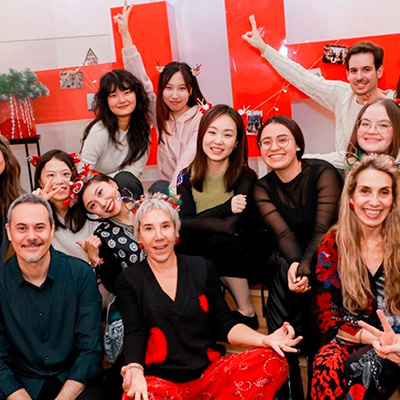
| Claudia Montes de Oca Internship in Shanghai, China |
| "This opportunity at the Miguel de Cervantes Library in Shanghai has allowed me to experience cultural management from a different perspective, get to know a new audience, and work alongside highly skilled and motivated cultural professionals. I would undoubtedly recommend this experience to any cultural management student." |
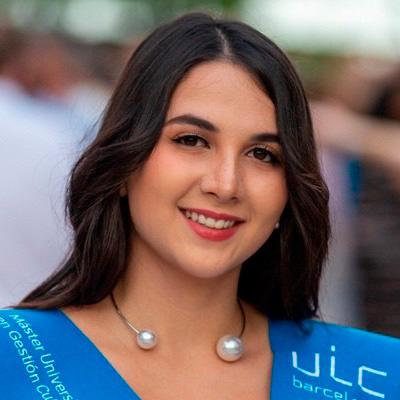
| Paulina Castañon Mancilla Internship in Dublin, Ireland |
| "These internships were an important opportunity to expand my network of contacts within the art world and to learn how to interact with people from different countries. My supervisor at the Cervantes Institute in Dublin was always open to answering my questions and made me feel like part of the team." |
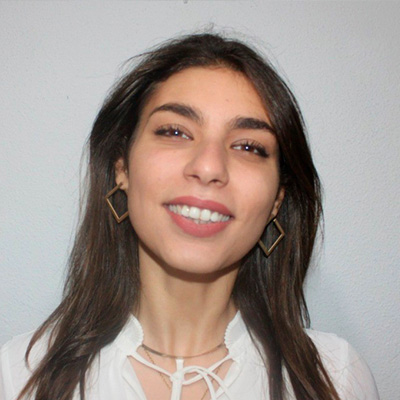
| Mirianna Auriemma Internship in Cairo, Egypt |
| "During my internship in cultural management, I was able to develop my skills and expand my knowledge in the field of cultural management; above all, thanks to the Cervantes Institute in Cairo, I had the opportunity to engage with the Spanish-speaking world." |
Study Abroad Trip to Asia
Since 2025, the Master’s Degree in Arts and Cultural Management includes a study abroad trip to Asia, designed as an intensive academic and professional experience for the participating group of students.

This activity, developed in collaboration with The Chinese University of Hong Kong, combines masterclasses, visits to cultural institutions, and meetings with industry professionals, providing students with a cultural immersion in Asia.
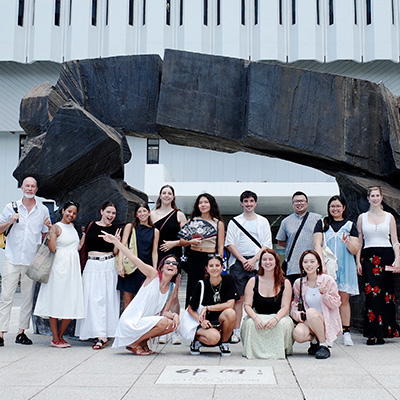
| Serena Budelli |
| "My academic exchange in Hong Kong was a unique experience. It not only gave me the opportunity to explore the city but also allowed me to gain new perspectives on potential career paths related to art and culture. I realized that with an open mind and a genuine willingness to communicate, connecting with a culture so different is not only possible but profoundly enriching." |
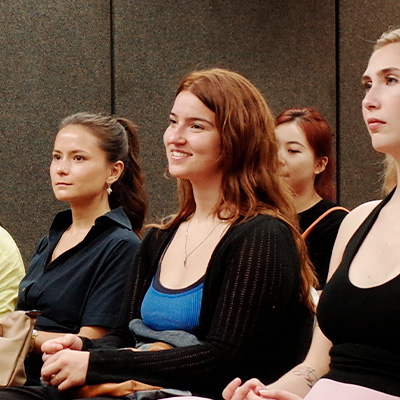
| Emma López García |
| "This experience has allowed me to keep a much more open mind and to understand very different contexts and approaches to cultural management. I leave feeling much more motivated, better prepared for my career, and with valuable connections and lessons learned." |
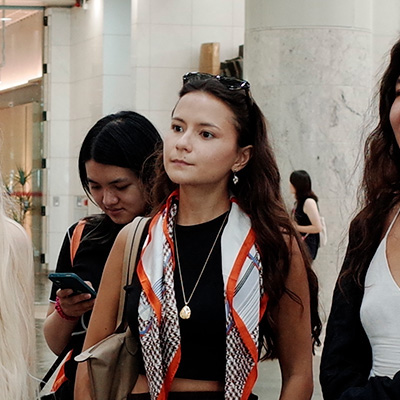
| Meagan Zoe Scantlebury |
| "I believe the programming, planning, and presentations were extremely well thought out. I enjoyed participating in the morning lectures that were directly related to the visits scheduled for that same day. It was fantastic to learn about the “ground-level,” governmental, and commercial aspects of the cultural sector in Hong Kong." |
Double Degree in the United States
The Master’s Degree in Arts and Cultural Management offers its recent graduates the opportunity to pursue a double degree at Boston University (United States), expanding their education with prestigious programs such as the Master of Science in Arts Administration, the Graduate Certificate in Fundraising Management, and the Graduate Certificate in Arts Administration.

These programs, offered at BU’s Metropolitan College since 1993, have become benchmarks in Arts Administration due to their strong connection with the U.S. cultural sector.
Incoming mobility
If you are studying at another Spanish or international university, you can undertake a mobility stay at UIC Barcelona.
Currently, the Master’s Degree in Arts and Cultural Management at UIC Barcelona has agreements with the following European universities: University of Osijek (Croatia), Université Catholique de Lyon (France), Université de Bourgogne (France), and the Latvian Academy of Culture (Latvia).

If you want to learn about the specific incoming mobility criteria for the University Master’s Degree in Cultural Management, please contact the International Relations Office at the Barcelona Campus: exchange.bcn@uic.es
Other Mobility and Academic Exchange Agreements
In recent years, the Master’s Degree in Arts and Cultural Management has promoted strategic agreements with leading institutions in diverse geographical and cultural contexts, such as universities and centers in Italy (Università Telematica Pegaso), Nigeria (Yemisi Shyllon Museum, Pan-Atlantic University), Iraq (University of Kurdistan Hewlêr), Hong Kong (The Hong Kong University of Science and Technology), and the Philippines (De La Salle-College of Saint Benilde).

These partnerships expand opportunities for mobility, education, and academic collaboration in the field of cultural management across Europe, Asia, Africa, and the Middle East.
Alumni Ambassador
Meet our Alumni Ambassadors
Alumni Ambassadors are former students who have volunteered to talk about their experience at UIC Barcelona. With them you can address any doubts about your chosen studies, the university and the student experience.
The Alumni Ambassadors are volunteer alumni who will explain their experience at UIC Barcelona to you. With them you will be able to resolve any doubts that may arise about the chosen program, the University and your experience as a student.
What questions can you ask an Alumni Ambassador?
- What do you value most about this program?
- What profile of students studied it?
- What do you think about teachers?
- What professional practices did you do?
- What are the advantages of studying in Barcelona?
- If he/she already has a job and if he had a hard time finding one.
Don't miss this magnificent opportunity to learn first-hand what it means to do a program at UIC Barcelona and the value it brings you in the development of your career. If you have any specific questions about the admission process, scholarships, visas or financial aid, you can contact directly admisiones@uic.es.

